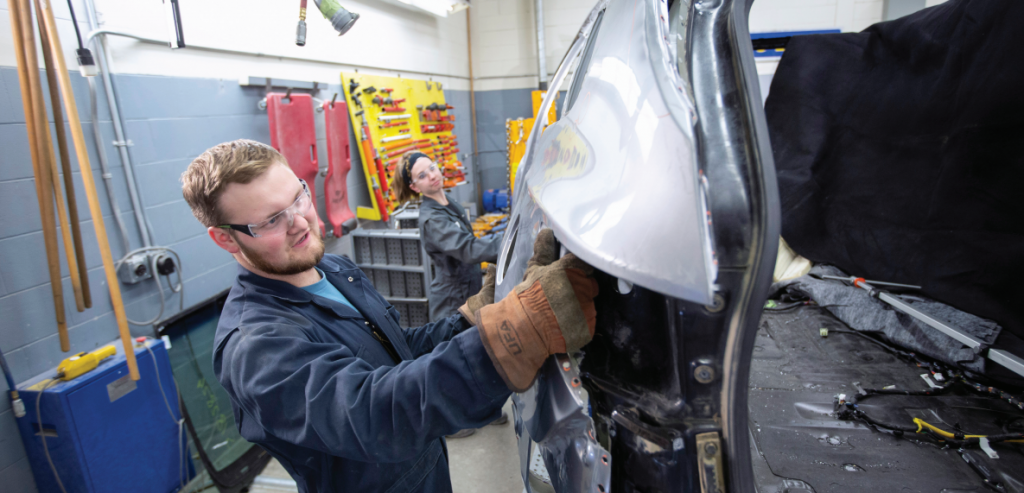Sask Polytech sets out a syllabus for the future
By Cindy MacDonald
Saskatchewan Polytechnic has upgraded its two autobody training facilities with up-to-date equipment and a focus on modern repair techniques to prepare students for careers in collision repair. The school has made many equipment purchases in the last few years and gone through a certification process with a third-party organization to receive certifications from several automakers.
Dale Hawkins, program head and instructor for the autobody program at the Regina campus of Sask Polytech, is proud of the school’s progress. “It’s been key for the students. We can teach them about new things, not the old ways.” This is partly due to the new equipment, he says, and partly because “certification holds you to a higher standard.” In addition, doing live repair jobs on late-model vehicles sourced from the provincial insurer pushes students to repair vehicles to OEM specs.
TRAINING TO A CURRENT STANDARD
Sask Polytech is the first post-secondary institution in North America to be recognized by Certified Collision Care. This certification recognizes organizations that have made investments in tools, equipment and training required to ensure vehicles are properly repaired to auto manufacturer specifications.
“As vehicle construction and design rapidly evolve, it is challenging for educational facilities to keep pace with change,” says Leanne Jefferies, vice-president of Canadian Operations at Assured Performance Certified Collision Care. “I am thrilled to have Saskatchewan Polytechnic be the first institution to achieve OEM certification with Fiat Chrysler, Ford, Kia and Nissan through the new Certified Collision Care Technical Institute & Community College Certification program. This achievement demonstrates their high level of commitment to excellence in providing students with relevant, up-to-date automotive training.”
Certified Collision Care manages the collision repair facility OEM certification programs for Fiat Chrysler, Ford, Nissan and Kia in Canada. Making the certification announcement in 2018, Dr. Larry Rosia, Sask Polytech president and CEO, commented: “This is a very proud moment to showcase the level and quality of training Sask Polytech provides our autobody technician program students. The OEM certification from Certified Collision Care emphasizes the worldclass education our students receive and will help to increase their job-readiness upon graduating.”
ADAPTING TO ALUMINUM
Hawkins recalls that outfitting both Regina’s and Saskatoon’s shops for aluminum repairs was one of the biggest challenges for certification. Both facilities had to invest in Ford specialty tools. Plus, in Regina, a new room was set aside for aluminum work, while Saskatoon uses a curtained-off area. Both shops added Pro Spot welders. In Saskatoon, two new paint booths were installed in this past year. The Regina facility added a new frame machine with a measuring system.
Hawkins says the equipment purchases were planned, but the purchases were accelerated to meet the needs of the certification program. To receive its OEM certifications, Sask Polytech followed the same rigorous process as collision repair facilities, except that some requirements regarding waiting rooms and replacement vehicles were waived since the college does not serve retail customers. During the certification process, compliance was documented and then verified on-site by an inspector.
Sask Polytech offers a one-year certificate and provides the in-school portion of apprenticeship training for the autobody technician programs. The programs provide students with a solid foundation in the knowledge and skills required to work in motor vehicle body repair and refinishing.
INITIATIVE REWARDED
Hawkins and Scott Kucharyshen, the program head for the autobody technician program in Saskatoon, both received an innovation award from the school for their work on the certification project. In the award presentation it was also noted the pair are responsible for the school’s innovative relationship with Saskatchewan Government Insurance (SGI). Hawkins says the recognition by the college was very gratifying, and completely unexpected.
For 15 years, SGI has supplied vehicles to the college’s automotive service technician and autobody technician certificate programs. By using total-loss vehicles from SGI, students get to work on current model vehicles similar to what the industry repairs on a daily basis. Over the course of this partnership, more than 250 vehicles have been repaired by Sask Polytech students. Once the repairs and inspections are complete, the vehicles are used by SGI in its employee fleet. “The students work on live jobs, and they are working on new vehicles,” Hawkins explains. On any given day, the oldest vehicle in the Regina shop is likely to be a 2015. The repairs are cost-effective for SGI because the college doesn’t charge for its students’ labor. SGI supplies some of the parts; others are purchased by the college, plus the college pays for paint and refinish supplies.
Instructors at Sask Polytech are all Red Seal journeymen, and are expected to hold or be working toward Platinum individual I-CAR standing. The two autobody facilities are working toward I-CAR Gold Class recognition. Hawkins say it can be challenging for the instructors “ We don’t get to practice every day.” They can bring in vehicles if they need to practise on specific tasks/skills.
This year, Regina has two student groups in the one-year program. Saskatoon has one group of 14 students. The college also offers apprenticeship training several times a year. The program is not only attractive to local students. In recent years, there have often been groups of international students, and Hawkins says students from Alberta, B.C. and Ontario have gone through the program.
Hawkins says the dean, associate dean and academic chair have been supportive of the progressive ideas for the autobody program. “All the good stuff that we’ve been doing around here. None of that would have been possible without our supportive leadership. It goes all the way to the president.”
Hawkins is convinced the certification, the opportunity to work on new cars and the new equipment will bring in more students. “Our enrollment numbers five to six years ago were bleak.but now we have a wait list.” Clearly, the Sask Polytech team is on the right track. TD




















